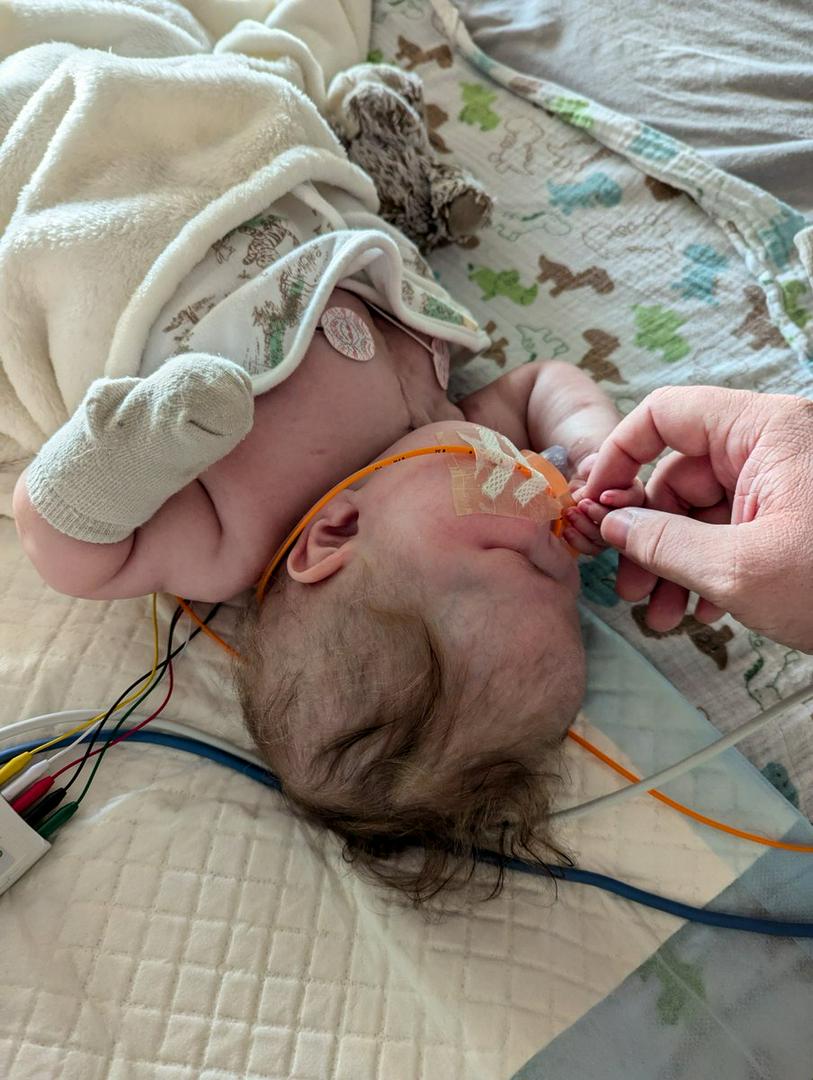It's hard to believe it has been a month - 4 weeks today - since my son died. He lived for nearly eight months in the hospital. It felt like a lifetime. Yet, in the blink of an eye, we've already lived 1/8 of that time without him. I've been meditating lately on my son's transition from a present reality to a transient memory. (For me, it's mostly an intellectual exercise at this point. I'm too burnt out and numb for sorrow and tears - though there is still an element of pain to it all.) My son is no longer here. That is not to say he no longer is. It is only to say that I can no longer experience him as he was. His realness did not cease. But it did change. He left me in the dust. One of these pictures represents the last time he held my finger before our new normal was blown to pieces - Friday, July 19th - the day before he died. The consequence of his absence is that I can no longer perceive him. He now exists beyond the pale of my touch, smell, sight, and hearing. As a result, reality is exchanged with a memory - and that memory is fading. It's like a second experience of death, but it is slower, more subtle, and in a way, more personal: my very mind is being plundered of its most precious recollections. How can I describe it? It's like a sandcastle constructed along the violent borders of the ocean. All our lives are built and expended here: on the edge of dissolution. Our lives are but a vapor. We are like the grass that flowers and fades. The best we can do with our fragility is heed the words of Christ and build our undying souls on solid rock (Matt. 7:24-27). But even that doesn't change the fact that death will come - it only changes how we greet it when it does. As the tide changes and the waves creep up to the base of your castle, the erosion is subtle at first, but in a moment, dramatically, it all comes tumbling down. It crumbles. All that remains is a disfigured lump of sand. Your handiwork is no longer perceptible but the rubble at least testifies to the fact that something was there. But the ocean makes quick work of that too. As the tide steadily rushes in, the rubble becomes a mound. The mound becomes a lump. In no time at all the ocean has swallowed it up. By the time the tide retreats, there will be little to no evidence a castle was ever there. Reality is displaced by memory, and memory, unaided by fresh impressions, is slowly eroded by the passing of time. This itself invites new grief. Am I grieving my son, or am I now grieving the memory of my son? It is likely a mixture of both. In a strange reversal of the Greek mythology of the underworld, it is as though the living, and not the dead, are compelled to drink from the River Lethe and forget. Of course, I know I won't really forget Gus. I'm just painfully aware that this memory, increasingly disfigured by the passing of time, is a poor reflection of the reality, of the real him as he was. C.S. Lewis acknowledges this in A Grief Observed. Rightly so, he further acknowledges that the person we've lost is not now locked in the same state in which they left us. Even believing that my son continues to be does not mean he will ever again be what he was; that we will ever again be what we were. Even the hope of heaven does not completely soothe this ache. At the risk of blathering on to the annoyance of whoever reads this far, I must add a further observation: part of what makes this all so hard is that we never brought Gus home. My son lived and died in the hospital. While that place became a second home and a 'new' normal, his death rudely returned my 'old' normal. This new old is a confusing and bewildering thing. Sometimes it feels like the last year of my life never even happened. It's as though it was all a dream. It's as though it all took place in a weird, liminal space. It's like I met my son in Elfland. We visited him on the Isle of Avalon. He lived and died in Neverland. I've discovered that my son's death not only includes this harsh exchange between reality and mere memory, but it seems to bring into question what once was real - or, at the very least, that is how it all feels. Whatever I forget, my God does not. My son is lost to me - but I know Who keeps him. He cannot come to me, but I can go to him. --- Time, like an ever-rolling stream, Bears all its sons away; They fly forgotten, as a dream Dies at the opening day. Like flowery fields the nations stand, Pleased with the morning light; The flowers beneath the mower’s hand Lie withering e’er ’tis night. Our God, our help in ages past, Our hope for years to come, Be thou our guard while troubles last, And our eternal home. (Isaac Watts)
Get updates delivered to you daily. Free and customizable.
Emily MacMillan
Comments / 0
Add a Comment
YOU MAY ALSO LIKE
 Most Popular
Most PopularCooking With Maryann1 day ago
Alaska State1 day ago
Herbie J Pilato25 days ago
Emily Standley Allard2 days ago
Colorado State17 days ago
Cooking With Maryann8 hours ago
The Current GA21 days ago
Herbie J Pilato26 days ago
Denver, CO21 days ago
Florida State19 days ago
Herbie J Pilato16 days ago
Get updates delivered to you daily. Free and customizable.
It’s essential to note our commitment to transparency:
Our Terms of Use acknowledge that our services may not always be error-free, and our Community Standards emphasize our discretion in enforcing policies. As a platform hosting over 100,000 pieces of content published daily, we cannot pre-vet content, but we strive to foster a dynamic environment for free expression and robust discourse through safety guardrails of human and AI moderation.



Comments / 0